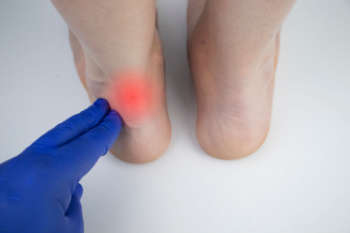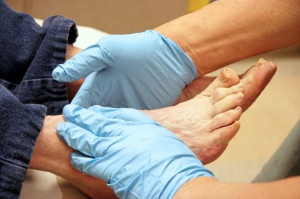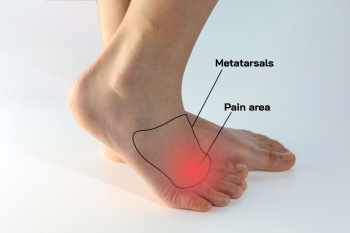Items filtered by date: August 2024
Pain and Burning in the Achilles Tendon

Pain and burning sensations in the Achilles tendon often stem from various causes related to overuse and strain. Repetitive activities, especially those involving running or jumping, can lead to inflammation known as Achilles tendinitis. This condition arises when the tendon, connecting the calf muscles to the heel bone, becomes irritated from excessive stress. Another common issue is Achilles tendinosis, where chronic degeneration of the tendon tissue causes discomfort and a burning feeling. Tight calf muscles and wearing improper footwear can also contribute to tendon pain. To address these issues, it is vital to rest the affected area, and incorporate stretching exercises to improve flexibility. If you have pain in your calf, it is suggested that you consult a podiatrist who can accurately diagnose Achilles tendon injuries, and offer effective treatment methods.
Achilles tendon injuries need immediate attention to avoid future complications. If you have any concerns, contact one of our podiatrists of Highlands Foot and Ankle. Our doctor can provide the care you need to keep you pain-free and on your feet.
What Is the Achilles Tendon?
The Achilles tendon is a tendon that connects the lower leg muscles and calf to the heel of the foot. It is the strongest tendon in the human body and is essential for making movement possible. Because this tendon is such an integral part of the body, any injuries to it can create immense difficulties and should immediately be presented to a doctor.
What Are the Symptoms of an Achilles Tendon Injury?
There are various types of injuries that can affect the Achilles tendon. The two most common injuries are Achilles tendinitis and ruptures of the tendon.
Achilles Tendinitis Symptoms
- Inflammation
- Dull to severe pain
- Increased blood flow to the tendon
- Thickening of the tendon
Rupture Symptoms
- Extreme pain and swelling in the foot
- Total immobility
Treatment and Prevention
Achilles tendon injuries are diagnosed by a thorough physical evaluation, which can include an MRI. Treatment involves rest, physical therapy, and in some cases, surgery. However, various preventative measures can be taken to avoid these injuries, such as:
- Thorough stretching of the tendon before and after exercise
- Strengthening exercises like calf raises, squats, leg curls, leg extensions, leg raises, lunges, and leg presses
If you have any questions please feel free to contact our office located in Waco, TX . We offer the newest diagnostic tools and technology to treat your foot and ankle needs.
Stop Your Toenail Fungus
Foot Care Tips for Diabetic Patients

People with diabetes need to prioritize foot care to prevent complications such as infections, ulcers, and gangrene, which can sometimes result in severe outcomes. Nerve and blood vessel damage from high blood sugar can lead to decreased sensation and poor circulation in the feet. Foot care tips for diabetics include daily inspection of the feet for cuts, blisters, and abnormalities is essential. Wearing properly fitting shoes and socks is also important, as it helps protect against injuries and discomfort that might go unnoticed due to reduced sensation. Maintaining good blood sugar control is vital to promote healing and prevent infections. Additionally, washing feet daily with warm water, ensuring they are thoroughly dried, and moisturizing them can help maintain skin health. It is advisable to walking barefoot and to engage in regular physical activity to improve circulation. If any foot issues arise, a podiatrist can offer specialized care of your feet. If you have diabetes, it is suggested that you schedule regular appointments with a podiatrist for ongoing foot treatment.
Diabetic foot care is important in preventing foot ailments such as ulcers. If you are suffering from diabetes or have any other concerns about your feet, contact one of our podiatrists from Highlands Foot and Ankle. Our doctor can provide the care you need to keep you pain-free and on your feet.
Diabetic Foot Care
Diabetes affects millions of people every year. The condition can damage blood vessels in many parts of the body, especially the feet. Because of this, taking care of your feet is essential if you have diabetes, and having a podiatrist help monitor your foot health is highly recommended.
The Importance of Caring for Your Feet
- Routinely inspect your feet for bruises or sores.
- Wear socks that fit your feet comfortably.
- Wear comfortable shoes that provide adequate support.
Patients with diabetes should have their doctor monitor their blood levels, as blood sugar levels play such a huge role in diabetic care. Monitoring these levels on a regular basis is highly advised.
It is always best to inform your healthcare professional of any concerns you may have regarding your feet, especially for diabetic patients. Early treatment and routine foot examinations are keys to maintaining proper health, especially because severe complications can arise if proper treatment is not applied.
If you have any questions, please feel free to contact our office located in Waco, TX . We offer the newest diagnostic and treatment technologies for all your foot care needs.
What Is a Podiatrist and Why You Might Want to See One
 Podiatrists are medical professionals who specialize in diagnosing and treating conditions related to the feet, ankles, and lower extremities. They undergo extensive education and training, typically earning a Doctor of Podiatric Medicine, or DPM, degree, followed by a residency program. Podiatrists are equipped to handle a wide range of issues, from common problems like bunions, heel pain, and ingrown toenails to more complex conditions such as diabetic foot complications, fractures, and sports injuries. They utilize various diagnostic tools, including X-rays, ultrasounds, and lab tests, to accurately assess foot and ankle health. Treatment options may range from conservative approaches, like wearing orthotics and targeted stretching exercises, to surgical interventions when necessary. Podiatrists also play a critical role in preventive care, providing guidance on proper footwear, foot hygiene, and exercises to maintain foot health. If you have any foot or ankle concerns, it is suggested that you schedule an appointment with a podiatrist for care.
Podiatrists are medical professionals who specialize in diagnosing and treating conditions related to the feet, ankles, and lower extremities. They undergo extensive education and training, typically earning a Doctor of Podiatric Medicine, or DPM, degree, followed by a residency program. Podiatrists are equipped to handle a wide range of issues, from common problems like bunions, heel pain, and ingrown toenails to more complex conditions such as diabetic foot complications, fractures, and sports injuries. They utilize various diagnostic tools, including X-rays, ultrasounds, and lab tests, to accurately assess foot and ankle health. Treatment options may range from conservative approaches, like wearing orthotics and targeted stretching exercises, to surgical interventions when necessary. Podiatrists also play a critical role in preventive care, providing guidance on proper footwear, foot hygiene, and exercises to maintain foot health. If you have any foot or ankle concerns, it is suggested that you schedule an appointment with a podiatrist for care.
If you are experiencing pain in the feet or ankles, don’t join the stubborn majority refusing treatment. Feel free to contact one of our podiatrists from Highlands Foot and Ankle. Our doctor can provide the care you need to keep you pain-free and on your feet.
What Is a Podiatrist?
Someone would seek the care of a podiatrist if they have suffered a foot injury or have common foot ailments such as heal spurs, bunions, arch problems, deformities, ingrown toenails, corns, foot and ankle problems, etc.
Podiatric Treatment
A podiatrist will treat the problematic areas of the feet, ankle or lower leg by prescribing the following:
- Physical therapy
- Drugs
- Orthotic inserts or soles
- Surgery on lower extremity fractures
A common podiatric procedure a podiatrist will use is a scanner or force plate which will allow the podiatrist to know the designs of orthotics. Patients are then told to follow a series of tasks to complete the treatment. The computer will scan the foot a see which areas show weight distribution and pressure points. The podiatrist will read the analysis and then determine which treatment plans are available.
If you have any questions, please feel free to contact our office located in Waco, TX . We offer the newest diagnostic and treatment technologies for all your foot care needs.
Understanding Morton’s Neuroma
 Morton's neuroma is a painful foot condition caused by the thickening of the tissue surrounding the nerves leading to the toes, usually between the third and fourth toes. This condition often results from repetitive stress or wearing tight, high-heeled, or narrow shoes, leading to nerve irritation. Symptoms can include burning pain in the ball of the foot, tingling, or numbness in the toes, and discomfort that worsens with walking, standing, or wearing constricting footwear. Diagnosis involves a physical examination, with imaging tests like ultrasounds or MRI scans used to rule out other conditions. Treatment focuses on relieving pressure on the affected nerve. Initial approaches include switching to wider shoes, using orthotic devices, and taking anti-inflammatory medications. In more severe cases, corticosteroid injections or surgical removal of the thickened tissue may be necessary. If you feel you may have Morton's neuroma, it is suggested that you schedule an appointment with a podiatrist for a proper diagnosis and treatment.
Morton's neuroma is a painful foot condition caused by the thickening of the tissue surrounding the nerves leading to the toes, usually between the third and fourth toes. This condition often results from repetitive stress or wearing tight, high-heeled, or narrow shoes, leading to nerve irritation. Symptoms can include burning pain in the ball of the foot, tingling, or numbness in the toes, and discomfort that worsens with walking, standing, or wearing constricting footwear. Diagnosis involves a physical examination, with imaging tests like ultrasounds or MRI scans used to rule out other conditions. Treatment focuses on relieving pressure on the affected nerve. Initial approaches include switching to wider shoes, using orthotic devices, and taking anti-inflammatory medications. In more severe cases, corticosteroid injections or surgical removal of the thickened tissue may be necessary. If you feel you may have Morton's neuroma, it is suggested that you schedule an appointment with a podiatrist for a proper diagnosis and treatment.
Morton’s neuroma is a very uncomfortable condition to live with. If you think you have Morton’s neuroma, contact one of our podiatrists of Highlands Foot and Ankle. Our doctor will attend to all of your foot care needs and answer any of your related questions.
Morton’s Neuroma
Morton's neuroma is a painful foot condition that commonly affects the areas between the second and third or third and fourth toe, although other areas of the foot are also susceptible. Morton’s neuroma is caused by an inflamed nerve in the foot that is being squeezed and aggravated by surrounding bones.
What Increases the Chances of Having Morton’s Neuroma?
- Ill-fitting high heels or shoes that add pressure to the toe or foot
- Jogging, running or any sport that involves constant impact to the foot
- Flat feet, bunions, and any other foot deformities
Morton’s neuroma is a very treatable condition. Orthotics and shoe inserts can often be used to alleviate the pain on the forefront of the feet. In more severe cases, corticosteroids can also be prescribed. In order to figure out the best treatment for your neuroma, it’s recommended to seek the care of a podiatrist who can diagnose your condition and provide different treatment options.
If you have any questions, please feel free to contact our office located in Waco, TX . We offer the newest diagnostic and treatment technologies for all your foot care needs.

